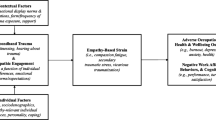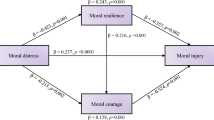Abstract
The aim of this study was to determine the correlation of the level of religious moral beliefs (RMB) with trauma experiences and posttraumatic stress disorder (PTSD) severity in war veterans of Bosnia and Herzegovina. The sample consists of 120 Bosnian war veterans divided into two equal groups—one with and one without PTSD. We used the Harvard Trauma Questionnaire and the RMB belief scale. We then correlated the severity of trauma experiences and PTSD symptoms with veterans’ scores on the RMB scale. The score on the RMB scale was negatively correlated to severity of trauma experiences and PTSD symptoms (Pearson’s r = −0.509, P = 0.004; Pearson’s r = −0.325, P < 0.001, respectively). The RMB may have protective role in the mental health stability of severely traumatized war veterans.
Similar content being viewed by others
Notes
Historically, the Magnificent God, through His prophets, announced that it is forbidden to kill people, and such laws were more or less passed by all state or social organizations, with the aim to provide peace and freedom for all people. No explanation can be found for killing the innocent because anyone has right to live! But, there were always people who were disobeying this decrees and recommendations by committing crimes against other people. Therefore, certain category of these criminals is punished by death and in some jurisprudence this punishment is still preserved. In certain situations, such as defensive wars for example, human is forced to perform such an act, and even then must keep in mind the principles of humanity and justice.
References
Allden, K., Cerić, I., Kapetanović, A., Lavelle, J., Loga, S., Mathias, M., et al. (1998a). Harvard Trauma Questionnaire: Bosnia–Herzegovina Version. Cambridge: Harvard Program in Refugee Trauma. (Available in English and Bosnian).
Allden, K., Frančišković, T., Lavelle, J., Mathias, M., McInnes, K., Mollica, R. F., Moro, L. (1998) Harvard Trauma Questionnaire: Croatian Veterans Version. Cambridge: Harvard Program in Refugee Trauma. (Available in English and Croatian).
Avdibegović, E., Hasanović, M., Selimbašić, Z., Pajević, I., & Sinanović, O. (2008). Mental health care of psychotraumatized persons in post war Bosnia and Herzegovina—Experiences from Tuzla canton. Psychiatria Danubina, 20(4), 474–484.
Brennen, T., Hasanović, M., Zotović, M., Blix, I., Skar, A. M., Prelić, N. K., et al. (2010). Trauma exposure in childhood impairs the ability to recall specific autobiographical memories in late adolescence. Journal of Traumatic Stress, 23(2), 240–247. doi:10.1002/jts.20513.
Connor, K. M., Davidson, J. R., & Lee, L. C. (2003). Spirituality, resilience, and anger in survivors of violent trauma: a community survey. J Trauma Stress, 16(5), 487–494. doi:10.1023/A:1025762512279.
Ćorić, Š. Š. (1998). Psihologija religioznosti. Jastrebarsko: Naklada Slap.
Delić, A., Hasanović, M., Avdibegović, E., Dimitrijević, A., Hancheva, C., Scher, C., et al. (2014). Academic model of trauma healing in post-war societies. Acta MedICA Academica, 43(1), 76–80. doi:10.5644/ama2006-124.103.
From, E. (1984). Zdravo društvo. Zagreb. Beograd: Naprijed. Nolit. August Cesarec.
Hasanović, M. (2011). Psychological consequences of war-traumatized children and adolescents in Bosnia and Herzegovina. Acta Medica Academica, 40(1), 45–66.
Hasanović, M. (2012). Posttraumatic stress disorder of Bosnian internally displaced and refugee adolescents from three different regions after the war 1992–1995 in Bosnia–Herzegovina. Paediatrics Today, 8(1), 22–31.
Hasanović, M., & Herenda, S. (2008). Post traumatic stress disorder, depression and anxiety among family medicine residents after 1992–95 war in Bosnia and Herzegovina. Psychiatria Danubina, 20(3), 278–286.
Hasanović, M., & Pajević, I. (2010). Religious moral believes as mental health protective factor of war veterans who are suffering from: PTSD, depressiveness, anxiety, tobacco and alcohol misuse in co-morbidity. Psychiatria Danubina, 22(2), 203–210.
Hasanović, M., & Pajević, I. (2013). Religious moral beliefs inversely related to trauma experiences severity and depression severity among war veterans in Bosnia and Herzegovina. Journal of Religion and Health, 52(3), 730–739. doi:10.1007/s10943-012-9643-4.
Hasanović, M., Sinanović, O., Pajević, I., & Agius, M. (2011). The spiritual approach to group psychotherapy treatment of Psychotraumatized persons in post-war Bosnia and Herzegovina. Religions, 2(3), 330–344.
Hasanović, M., Sinanović, O., Selimbašić, Z., Pajević, I., & Avdibegović, E. (2006). Psychological disturbances of war-traumatized children from different foster and family settings in Bosnia and Herzegovina. Croatian Medical Journal, 47(1), 85–94.
Hodgetts, G., Broers, T., Godwin, M., Bowering, E., & Hasanović, M. (2003). Post-traumatic stress disorder among family physicians in Bosnia and Herzegovina. Family Practice, 20(4), 489–491.
Kravić, N., Pajević, I., & Hasanović, M. (2013). Surviving genocide in Srebrenica during the early childhood and adolescent personality. Croatian Medical Journal, 54(1), 55–64.
Lyons, J. A. (1991). Self-mutilation by man with posttraumatic stress disorder. Journal of Nervous and Mental Disease, 179(8), 505–507.
Mihaljević, S., Aukst-Margetić, B., Vuksan-Ćusa, B., Koić, E., & Milošević, M. (2012). Hopelessness, suicidality and religious coping in Croatian war veterans with PTSD. Psychiatria Danubina, 24(3), 292–297.
Mollica, R. F., McInnes, K., Sarajlić, N., Lavelle, J., Sarajlić, I., & Massagli, M. P. (1999). Disability associated with psychiatric comorbidity and health status in Bosnian refugees living in Croatia. JAMA, 282(5), 433–439.
Nitzche, F. (2003). Genealogija morala – prevod sa njemačkog jezika Genealogie der Moral – Eine Streitschrift fon Friedrich Nitzche. Leipzig: Velag von C.G. Nauman. 1887. U: Niče: S onu stranu dobra i zla. Genealogija morala. Beograd: Dereta, 169–276.
Pajević, I. (1999). Utjecaj religioznosti na psihičko sazrijevanje i zdravlje adolescenata. Doktorska disertacija. Tuzla: Medicinski fakultet Univerziteta u Tuzli (Mentor: Prof. Dr. O. Sinanović).
Pajević, I., Hasanović, M., & Delić, A. (2007). The influence of religious moral beliefs on adolescents’ mental stability. Psychiatria Danubina, 19(3), 173–183.
Pajević, I., Hasanović, M., & Koprić, A. (2010). Psychiatry in a battle zone. Bioethics, 24(6), 304–307. doi:10.1111/j.1467-8519.2009.01742.x.
Pajević, I., Sinanović, O., & Hasanović, M. (2005). Religiosity and mental health. Psychiatria Danubina, 17(1–2), 84–89.
Pavlović, S., Hasanović, M., & Prelić, N. K. (2012). Changes in intellectual area in war veterans developed PTSD. Psychiatria Danubina, 24(Suppl 3), S377–S383.
Quackenbos, S., Privette, G., & Klentz, B. (1986). Psychotherapy and religion: rapprochement or antithesis? Journal of Conseling and Development, 65, 82–85.
Robinson, L. H. (1986). Psychoanalysis and religion: A comparison. In L. H. Robinson (Ed.), Psychiatry and religion. Washington, DC: American Psychiatric Press.
Schaefer, F. C., Blazer, D. G., & Koenig, H. G. (2008). Religious and spiritual factors and the consequences of trauma: A review and model of the interrelationship. International Journal of Psychiatry in Medicine, 38(4), 507–524.
Schulman, M. (2002). How to become moral: The source of moral motivation. In C. R. Snyder & S. J. Lopez (Eds.), Handbook of positive psychology. London: Oxford University Press.
Wansink, B., & Wansink, C. S. (2013). Are there atheists in foxholes? Combat intensity and religious behavior. Journal of Religion and Health, 52(3), 769–779.
Wilson, J., & Moran, T. (1997). Understanding and assessing PTSD in religion and spiritual context (22 chapter). In J. Wilson & T. Keane (Eds.), Assessing psychological trauma and PTSD: A handbook for clinical and legal practitioners. New York: Guilford Press.
Acknowledgments
This study is supported by the Tuzla Canton Ministry for Culture, Sport and Education, University Clinical Center Tuzla, to whom we would like to express our gratefulness. Also, we would like to thank the war veterans and their officers (who were not clinically treated) that accepted to participate in this study. Thanks to Muhammed Hasanović for his valuable contributions in this manuscript. Particular thanks to Zoe Oakley for English language-editing.
Conflict of interest
We have no potential conflict of interest pertaining to this submission to the Journal of Religion and Health.
Author information
Authors and Affiliations
Corresponding author
Rights and permissions
About this article
Cite this article
Hasanović, M., Pajević, I. Religious Moral Beliefs Inversely Related to Trauma Experiences Severity and Presented Posttraumatic Stress Disorder Among Bosnia and Herzegovina War Veterans. J Relig Health 54, 1403–1415 (2015). https://doi.org/10.1007/s10943-014-9954-8
Published:
Issue Date:
DOI: https://doi.org/10.1007/s10943-014-9954-8




